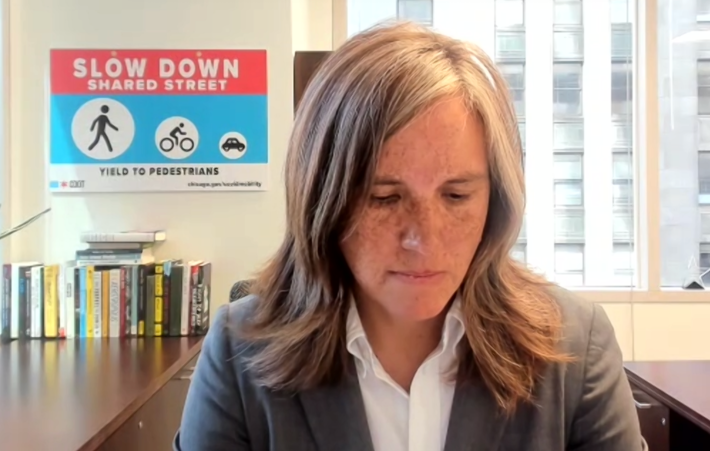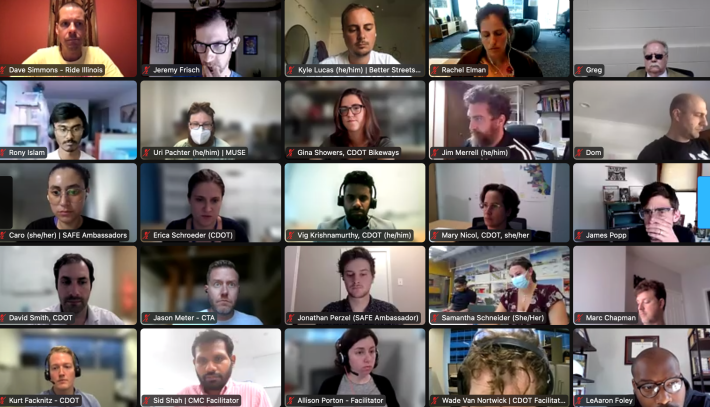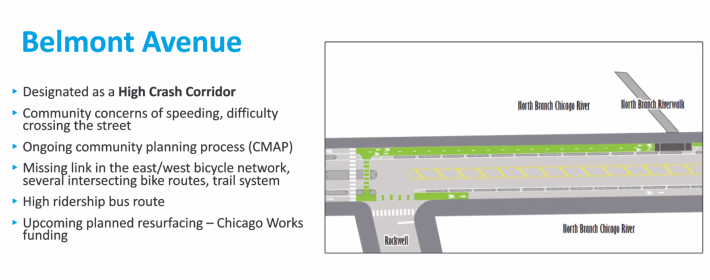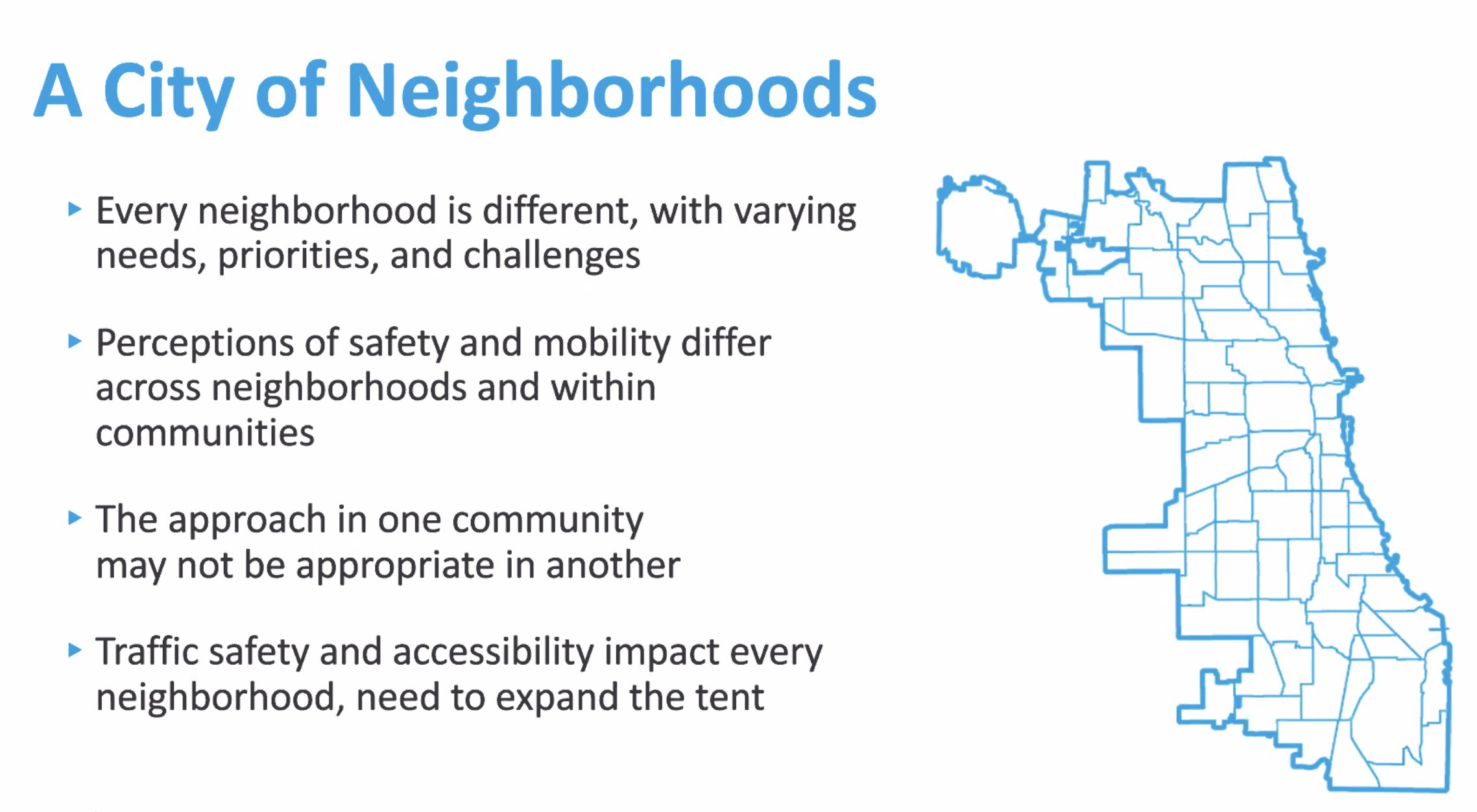The quarterly Mayor's Bicycle Advisory Council and Mayor's Pedestrian Advisory Council meetings were very useful forums for residents to learn about new mobility initiatives from Chicago Department of Transportation staff and provide feedback. But the MBAC meetings in particular were sometimes uncomfortable affairs for CDOT employees, because it wasn't uncommon for attendees to angrily accuse the department of not doing enough enough to keep vulnerable road users safe, often justifiably.
So it was no surprise when CDOT used COVID-19 as an excuse to pull the plug on these meetings, which the department seemed to view as a bit of a hassle to host. After the last MBAC meeting in March 2020, more than two years went by with no replacement for these important hearings. In retrospect, that was completely inexcusable, since most other kinds of community meetings, including ones about upcoming transportation projects, simply switched to Zoom during the pandemic. It's pretty clear that CDOT didn't host MBAC and MPAC meetings for two years because it preferred not to bother with them.
However, advocates have been making noise about about this issue in recent months, particularly as Chicago has seen a spike in bicycle fatalities. Drivers killed ten bike riders on Chicago streets last year, the most in the past decade. Motorists have already fatally struck five people on bikes this year, including two children this month: Lily Shambrook, 3, and Joshua Avina, 15.
Finally CDOT announced a replacement for MBAC and MPAC, a new quarterly forum called the Chicago Mobility Collaborative. That means the department only has to host half as many meetings. But the advisory council meetings already tended to be rushed affairs that often went way over schedule. Combining both bike and pedestrian issues into a single hearing means residents will have even less time to speak their minds on these topics, which cynics might argue is exactly what CDOT intended.
Held in the wake of the 2020 Black Live Matter protests, the CMC has a stated goal of incorporating social justice into transportation planning. "Four times a year CMC will bring residents and community organizations together with CDOT to help build a safer, equitable, and more accessible transportation system for everyone," the meeting registration page promised. That's certainly a worthwhile objective.

At the start of the meeting, CDOT program manager Amanda Woodall outlined the ground rules, urging attendees to bring a collaborative spirit; be "kind and respectful"; and to check their privilege. "Center the experience of people who are most marginalized," she requested.
The thing is, the transportation department could take one very simple action to help broaden the demographics of who has a say in Chicago mobility projects, but for some reason it has resisted doing so. For years advocates have complained that because MBAC and MPAC meetings were held on weekdays at 3 p.m., it was impossible for people to attend if they work 9-to-5 jobs that require showing up in person. Just about every other kind of community meeting on Chicago transportation is held after business hours.
Nevertheless, the CMC forum was held at the same time of day as before. It's silly for CDOT to spout lofty words about equity when they still haven't changed the meeting time to allow blue-collar workers to attend. Asked about this issue at the meeting, a CDOT representative said that the meeting format is still in flux. But if the department doesn't want to change the meeting time because holding it after hours would be slightly less convenient for CDOT staffers, it really should drop its pretensions of caring about social justice.
That said, the meeting had excellent attendance, with some 190 people taking part in the Zoom. And there was plenty of useful information for, and interesting commentary by, citizens who attended.

Projects discussed included topics we've recently covered on Streetsblog, such as the Complete Streets makeover of Belmont Avenue in the 35th Ward, and CDOT's recently-announced plan to upgrade all of Chicago's flexi-post bike lanes with concrete protection. Check out this cool, just-announced treatment planned for the south end of the 312 RiverRun trail system at Belmont and Rockwell, which will make it much safer and easier to bike to and from this great new off-street path network.

But one of the best reasons to attend this meeting was insightful commentary from Chicagoans about what needs to be done to make our city safer for all residents to get around by foot and bike. Here are a few sample remarks.
- Rony Islam: "I believe when we build streets that encourage folks that don't *have* to drive to use active transit, then the streets are better for people who do need to drive."
- Jacob Peters: "In my neighborhood many people walk, bike, and take the bus, but the barriers of highways, rail viaducts, unsheltered bus stops, and intimidating stroads stifle those trips from being for anything other than a small pocket that is often less than a quarter mile from your home."
- Becca H: "I feel like I unfortunately have to default to cars in situations where there are ghost buses and trains and extremely extended wait times making it near impossible to get to work in a reasonable time without resorting to an Uber."
- Carl Beien: "Instead of spending $800 million on the Jane Byrne interchange, we should spend $800 million to make streets safer."
Read Streetsblog's detailed Twitter thread on the meeting here.





